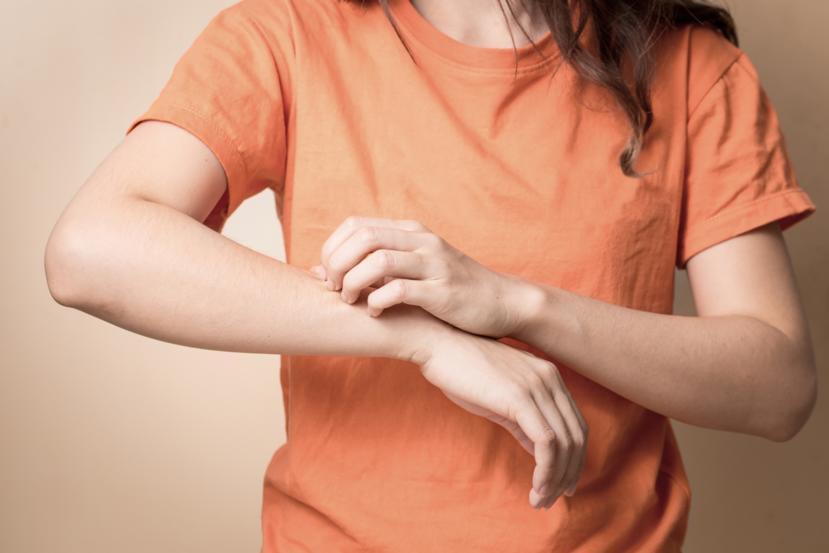Do I Have Eczema or Psoriasis?

Eczema and psoriasis are both skin diseases, and quite similar in their symptoms. Both conditions result in the formation of red patches or scales on the skin. To figure out whether you have eczema or psoriasis, you will need to examine the differences between the two.
Eczema
Eczema is normally diagnosed in children, often before the age of five. This skin condition usually attacks parts of the body and can be transmitted from one body part to another. However, it is not contagious.
The disease causes the development of a dry, rough, and sensitive skin. The section of the skin infected can also become swollen and red or discolored for those with darker skin. In some cases, these swellings can crack and burst, releasing a fluid. The skin also becomes itchy and may develop rashes. Eczema can also result in the development of scaly skin that can flake off.
Psoriasis
Psoriasis is remarkably similar to eczema in the symptoms it comes with. The symptoms of this disease will vary from person-to-person. Generally, psoriasis will manifest by the development of one or more of the following symptoms:
• redness on the skin
• silvery scales
• small spots on the skin
• dry and cracked skin
• bleeding
• skin itching and soreness
• swollen or stiff joints
Mild cases of psoriasis usually appear as dandruff. This condition generally lasts for a while, usually some months before subsiding. Sometimes, the condition completely disappears after a few months.
The Differences Between Psoriasis and Eczema
- One way to tell whether you have psoriasis or eczema is to examine moisture in the affected areas. Eczema causes the skin to develop a flaky skin that can also have pimple bumps filled with fluids. These swellings may also ooze. Such do not occur in psoriasis. In psoriasis, the patients experience silvery scales on the skin that shed off.
- The triggers of the disease can also guide your assessment of the condition. Eczema flare-ups are usually the result of external triggers such as chemicals and animal dander. However, for psoriasis, the causes or triggers are internal health issues. It has been noted that, for example, people with diabetes are more likely to experience psoriasis flare-ups compared to those without.
- In most cases, eczema will be diagnosed in childhood. In fact, most cases of eczema are reported before a patient hits five years of age. On the other hand, psoriasis is most commonly diagnosed in adults. This can, however, only suggest the actual disease you are suffering from. In a few cases, people have been diagnosed with eczema even in their 50s.
- Eczema affects areas of the body with softer skin such as the back of the knees. However, psoriasis affects the areas of the body with tough skin such as the knees.
With these, you should be able to tell whether you are suffering from psoriasis or from eczema. Like eczema, psoriasis has no cure. However, both conditions can be controlled or treated using over-the-counter medications or prescription drugs. Given enough time, psoriasis will usually disappear or subside.
If you are still unsure of what skin condition you are suffering from, it is wise to consult a doctor. This way, you can be safer taking medications. If you choose to use over-the-counter medications, see your doctor if the condition does not subside.
The Fine Line Between Eczema and Psoriasis
Is psoriasis a skin condition? Yes. Is eczema a skin condition as well? Yes. Then what is the difference? The difference lies in its manifestation, signs, and symptoms.
Psoriasis is an autoimmune disorder, while eczema is a topical condition. Since psoriasis involves an overproduction of skin cells, it is bound to get flaky, patchy, and crusty. Eczema is often seen in younger people and mostly children, while psoriasis may occur later in life. Both of these conditions may first begin with rashes, itching, and irritation in the skin. Sometimes, eczema could form delicate cells with pus oozing out of the skin. Eczema mainly occurs in body creases and areas that are folded, moist or in constant frictional contact with the clothes and hair. In severe cases, the skin could cause burn-like lesions or extra flaky patches. It is recommended to rush to the doctor immediately or avoid the condition from reaching there in the first place.
Scratching the skin will only cause it to peel off and expose the underlying wounds. For this reason, scratching should not be done. Instead, use the topical ointment provided by the doctor. There is a very thin line between the visible identification of early eczema and psoriasis. At a later stage, the symptoms may differ as well as the involvement of other organs or body parts. Therefore, try and take care of it and control the condition in the first stage itself. Most of the treatments are effective and possible when the problem began very recently and is tested.
How Would You Know?
How would you know the exact difference between both conditions? The answer to this question is simple. You will figure out the symptoms and realize the differences. If you are unable to do so, you will have to visit your doctor and run some diagnostic tests. These tests will decipher the how and why, and give you a clear picture of your condition. In either case, self-diagnosis is the most harmful thing to do. The second most harmful practice is running a search on the internet. Do not research on Google and try to match the symptoms with the images shown. They could be highly misleading and will only end up misguiding you. Unless a physical examination has not been done, how would you even know what has been happening to your skin? Sometimes, certain deadly diseases have other underlying causes and they begin with skin eruptions, rashes, itchiness, and lesions. You need to make sure what you have is only eczema and nothing else. For this, you ought to get medical help and support. If any of the conditions arise, it is better to seek medical guidance.
















